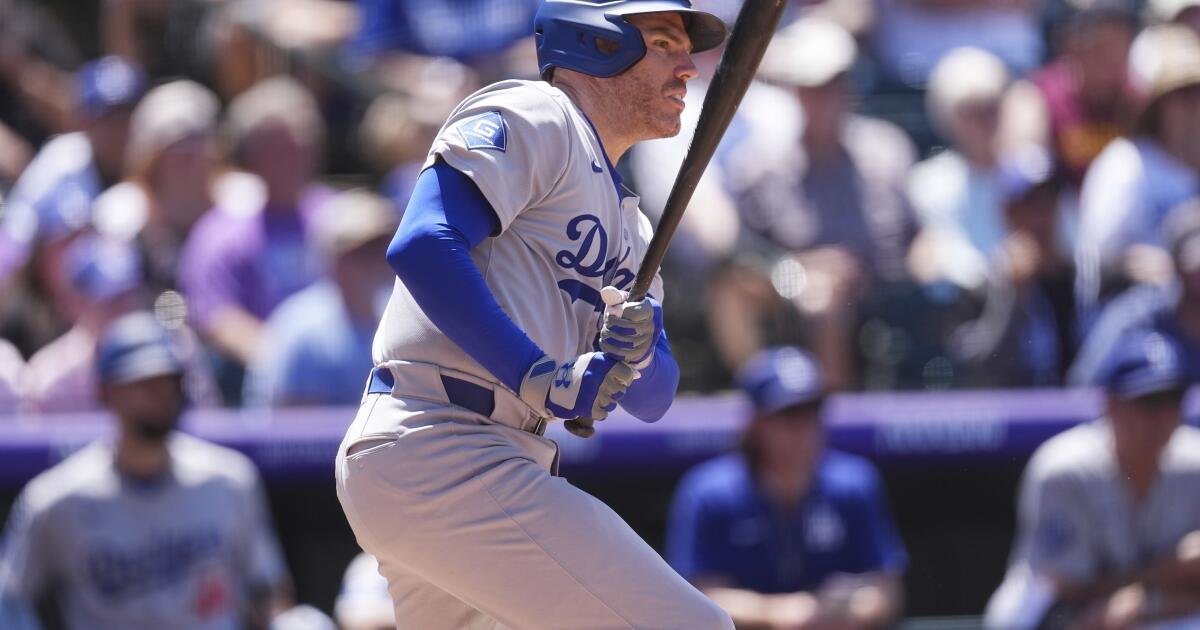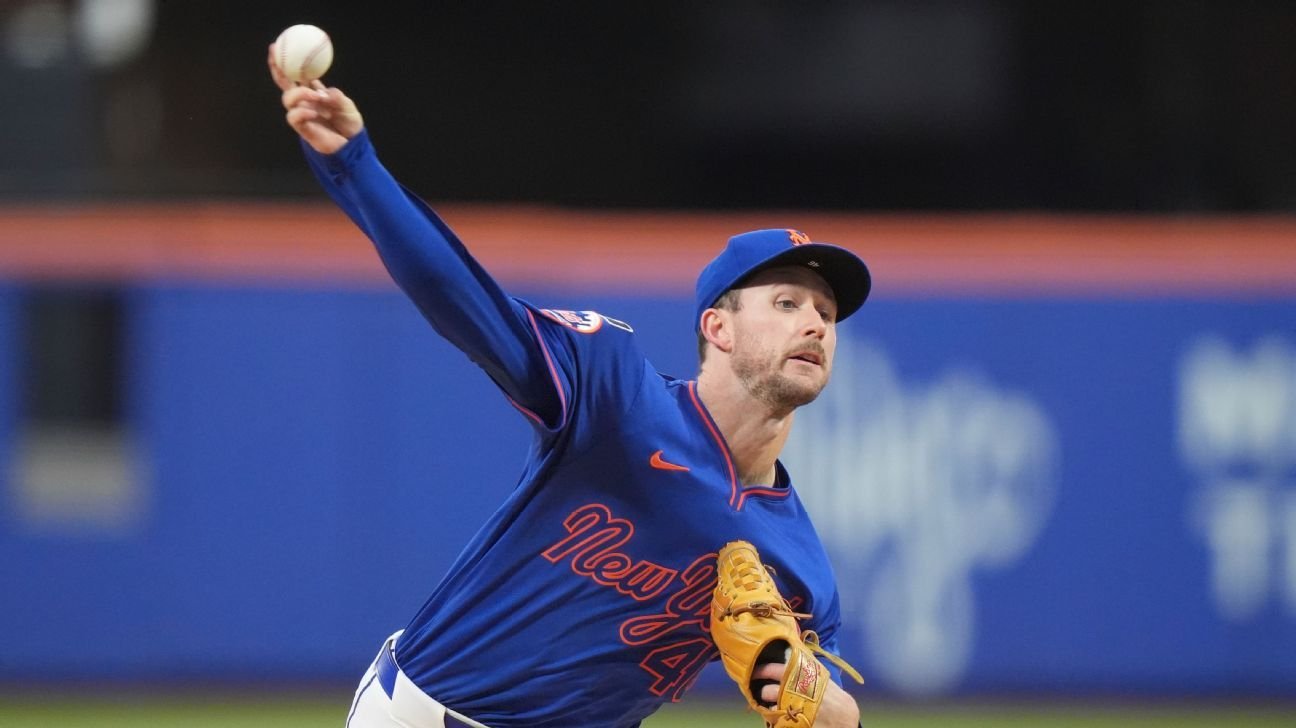DENVER — As the Dodgers completed a sweep of the Colorado Rockies on Thursday, it was two of their cornerstone hitters who helped lead the way.
In what was then a tie game in the top of the sixth inning, Mookie Betts led off with a double in the gap, Freddie Freeman brought him home with a line drive to right, and the Dodgers took a lead they wouldn’t relinquish, completing a three-game sweep that kept them tied for the best record in baseball.
For much of the last four years, that would’ve been an unremarkable sequence. Shohei Ohtani might be the most potent hitter in the Dodgers’ lineup, but Betts and Freeman have long been the bedrock of their offense; All-Stars in each season they’ve played in Los Angeles, and MVP candidates more often than not.
On Thursday, however, their sixth-inning heroics had a different feel. Because, for the last three weeks, both superstars have been mired in startlingly stark slumps.
Over Betts’ last 17 games, the former MVP is batting .191 with only one home run and eight RBIs — dropping his season-long production to just a shade above league average (he has a 106 OPS+, an all-encompassing stat in which 100 is considered league average).
Freeman’s last 20 games have been even worse, highlighted by a .160 average that marks the lowest of any single-season, 20-game stretch in his entire career — diminishing the stellar numbers he had this year beforehand.
Such coinciding struggles haven’t triggered any “long-term concerns,” manager Dave Roberts said this week. Thursday’s game provided some long-awaited production, a sigh of relief for two veteran sluggers who don’t often need one.
But still, the numbers are the numbers. A trip to even hitter-friendly Coors Field failed to fully bring them back to life. And until they rebound, external questions about their bats will linger, while their personal search for answers will carry on.
“I’ve been frustrated for about six weeks now,” Freeman said recently.
“If I knew [what was wrong],” Betts echoed this week, “I promise you I wouldn’t keep doing it.”
The Dodgers’ Mookie Betts remains adamant that playing shortstop is not the reason his numbers are down at the plate this season.
(Luke Johnson / Los Angeles Times)
It wasn’t long ago that both Betts and Freeman were on polar opposite trajectories, surging through most of May and early June on offensive heaters that evaporated their slow (and physically hampered) starts to the campaign.
On April 28, Betts was hitting only .230 with an OPS nearly below .700, clearly affected by a stomach virus that drained him over the two weeks leading up to opening day.
Then, in a 32-game stretch from April 29-June 7, his typical levels of production suddenly reappeared. He hit .312 with four doubles, four home runs and an .835 OPS. And he did it all while showing defensive mastery of shortstop, quieting a growing narrative that the toll of his new position was curbing his capabilities at the plate.
“It’s not about shortstop,” Betts said last month. “Because remember, last year, I was playing pretty well [offensively while] playing at shortstop. I had no idea what I was doing. Now, I’m way more confident in how I show up and prepare each and every day. The shortstop argument can’t be it.”
Given his recent skid, however, such speculation is back.
“I’m gonna hold to no,” Roberts said when asked about the dynamic again this week. “I think it’s a fair debate. But all I can go with is what Mookie is saying, as far as the separation of the hitting to the defense, the comfort level with the defense … So I don’t think there’s a correlation.”
Instead, Roberts pointed to a lack of power as a bigger factor. Betts’ .392 slugging percentage thus far is 50 points worse than his previous career-low (which came in his rookie 2014 season). He ranks below league-average in underlying metrics such as exit velocity, hard-hit percentage and bat speed most of all (slipping to the 11th percentile among MLB hitters in that category).
“I think it’s the lack of hitting the ball on the barrel,” Roberts said. “He’s a guy that knows how to find the barrel. But there’s times that he’s chasing a little bit more than he usually does. And then there’s a lot more pop-ups than typical. So to get power, you gotta find the barrel. That’s what we’re trying to do.”
Freeman has endured even more whiplash amid his rollercoaster season.
At the end of May, he was leading the National League with a .374 batting average. He was seemingly compensating for whatever lingering pain remained in the right ankle he had surgically repaired in the offseason, then re-aggravated with a slip in the shower at the end of March.
Even at age 35, he appeared primed for a potential career season, well on track for an elusive first batting title.

“He’s just been relentless,” Roberts said last month.
Now, however, one of the game’s best hit collectors can’t seem to buy a knock most days. His batting average has fallen all the way to .309 entering Friday. Before his Thursday afternoon single, he was 0-for-11 in the Rockies series and one-for-his-last-22 overall.
“I have seen some signs where he’s hit some balls hard and hasn’t gotten anything to show for it,” Roberts said, searching for positives amid Freeman’s highly uncharacteristic slump. “That’s discouraging for him. But I just know he’s gonna find his way out of it.”
To this point, though, he hasn’t, with his usual routine of slump-busting drills — from a net exercise designed to promote an inside-out bat path, to mental cues intended to help him stay back in his swing — having yet to get his mechanics re-aligned.
“I’ve gone through every cue 16 times over again in the last six weeks,” he said. “So just waiting for it to click.”
Though Freeman, who also battled a minor quadriceps injury in recent weeks, still looks hobbled while running the bases and playing defense at times, he insisted the problems aren’t injury-related.
“The only pain is the swing,” he said.
And despite his best efforts to conceal such frustrations during games, Roberts has noticed the toll his slump has started to take.
“I think he just wants consistency from his swing,” Roberts said. “Wants to feel right consistently.”
Somewhat amazingly, the Dodgers haven’t missed a beat even with their superstar pairing clearly out of tune. The team is 13-4 in its last 17 games. The offense has scored six runs per game in that span, half-a-run better than its already MLB-leading season average. Other middle-of-the-order bats — from current NL batting leader Will Smith, to June player of the month candidate Max Muncy and rising second-year star Andy Pages — have helped pick up the slack.
Ohtani, meanwhile, leads the National League with 28 home runs even while returning to two-way duties.
But in the long run, much of the Dodgers’ success still figures to run through Betts and Freeman. They are still the two most veteran, experienced producers in a lineup full of All-Star caliber talent.
At the very least, Roberts insisted, Thursday offered “something to build on.”
But with the way the last month has gone for each, there remains a lot of work left to do.


